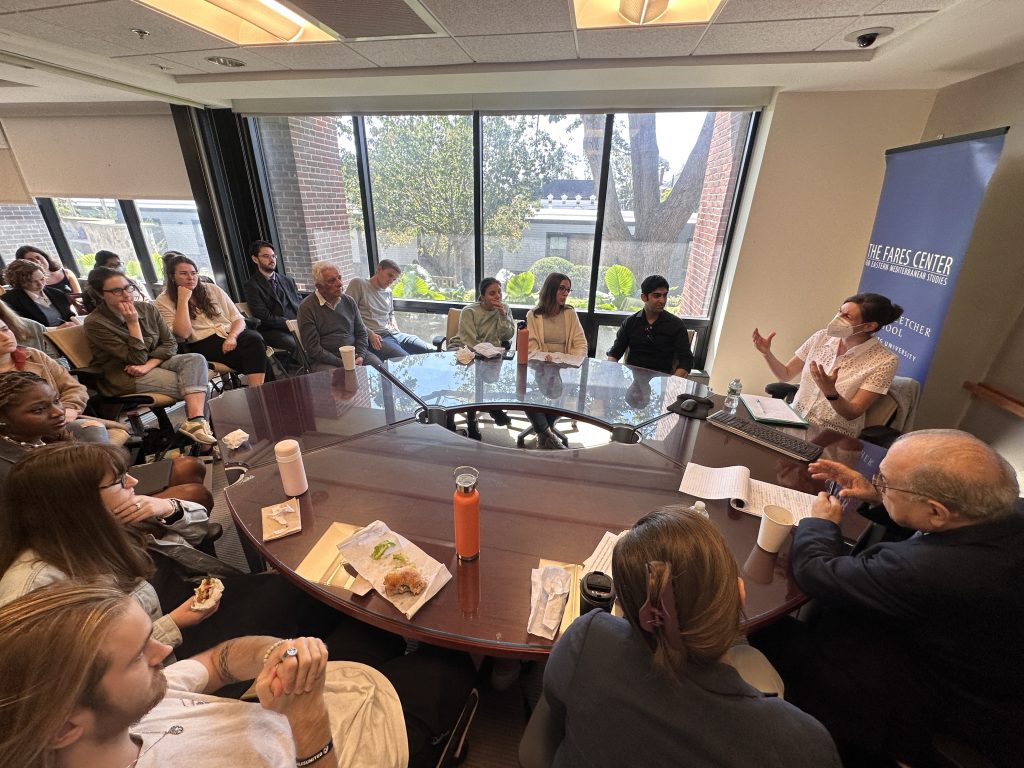
Decolonization’s discontents and contested colonial pasts: History, memory and identity politics in France and Algeria
On Wednesday, September 20, the Fares Center was delighted to host Professor Claire Eldridge who delivered an engaging and informative presentation on the topic of discontents of decolonization and discourses on identity in France and Algeria. The event was attended by several faculty members and over 40 students from the university.
An Associate Professor in European History at the University of Leeds, Eldridge’s research explores the interplay between empire, memory, and migration especially in the context of the historical relationship between France and Algeria.

Professor Eldridge began her talk by providing a historical and social background of the French colonization of Algeria and its eventual withdrawal from the country in 1962. While doing so, she introduced the audience to several yet distinct communities like Pied-Noirs who were residing in Algeria during the colonial rule.
Elaborating on the Pied-Noirs who migrated to France after the latter’s withdrawal from Algeria, Professor Eldridge discussed how the community was able to mobilize its alleged discontent through a memory base activism. In terms of what this memory comprised, the professor noted that it was founded on a selective and mythologized account of a harmonious Algeria under the auspices of the French colonial rule in which the settlers play a civilization role.
Tracing the ways in which Pied-Noirs constructed and deployed narratives about the past to build a communal identity and used it to negotiate with post-colonial France, Professor Eldridge discussed the ways in which communities establish not just discourses about their past but also particular frameworks to post-colonial civil society and identity politics that remain relevant even today. To this end, she noted the pivotal role played by community associations not only as aggregators and repositories of collective memory but also their function of reinforcing a particular narrative to substantiate it.
The presentation alluded to how Pied-Noir associations provided a model of collective mobilization and way of framing questions about memory and history that other groups borrowed from and or reacted against as they sought to advance their own strategic meaning to the colonial past.
The presentation highlighted a larger point of how communities develop a version of past to justify their present position and validate their world view.

Professor Eldridge also reflected upon other communities like Harkis who also had migrated from Algeria to France albeit for different reasons stemming mainly from fear of persecution for fighting along the French during the Independence war. The professor dwelled on the interactions between Pied-Noirs and Harkis and its impact on narratives.
In this regard, over the years, rival discourses led by Harkis, Algerian immigrants and veterans all seeking their place for a very different understanding of history have emerged in the public discourse. This had naturally affected the several myths and narratives that Pied-Noirs had successfully established over the historical discourse.
Professor Eldridge rounded up by alluding to how this increasingly diverse debate conveys the sense of how divisive the Algerian war was and the idea that these divisions are being replaced in the present day by memory carrying groups.
After the formal talk, a lively interaction took place between Eldridge and the audience. Replying to one of the questions from a student on possible racial logic at play in French government’s treatment of Pied-Noirs and Harkis, Professor Eldridge stressed that since Pied-Noirs were French citizens, they were naturally treated in a better way than other immigrants. That said, she did however point the Harkis and other immigrants’ groups did encounter a host of issues including segregation.
The event ended with a note of thanks from the Director of Fares Center Professor Nadim Rouhana. He expressed his gratitude to the visiting professor for shedding light on the topic and hoped that the talk will lead to students taking more interest in the area of post-colonial discourses and their relevance.

